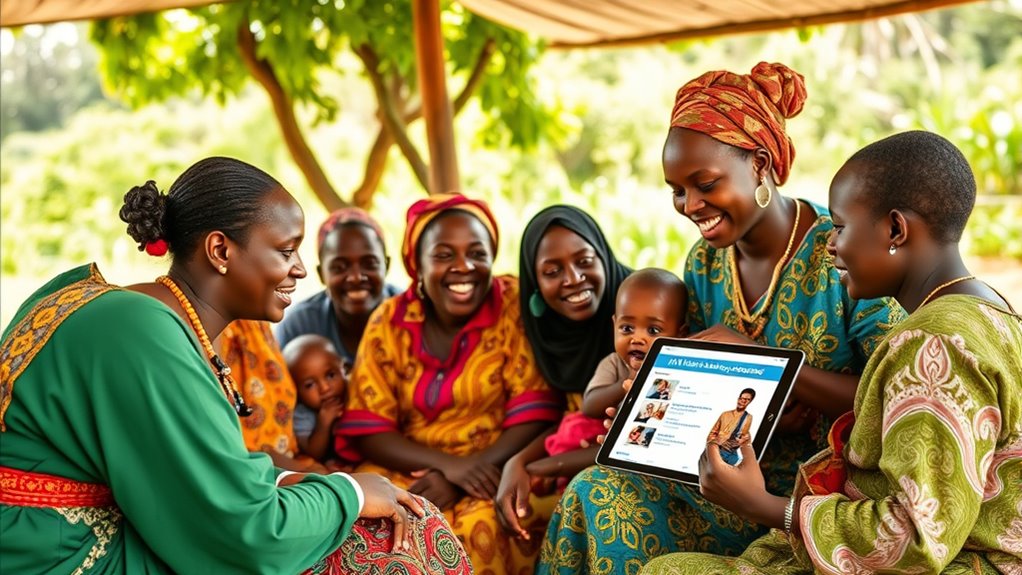Testing AI health campaigns for mothers in Kenya and Nigeria shows promising results in improving maternal and neonatal outcomes. In Kenya, AI tools like ultrasound diagnostics and SMS-based programs promote early detection and health awareness, while Nigeria’s campaigns like Mwana support breastfeeding through accessible, multilingual messaging. While these efforts face challenges like cultural appropriateness and integration, ongoing innovations continue to enhance effectiveness. Keep exploring how these developments are shaping maternal care across these nations.
Key Takeaways
- Pilot studies assess AI tools like OPOCUS and SMS campaigns to evaluate their impact on maternal health awareness and care-seeking behaviors.
- Cultural relevance and language accessibility are crucial in designing AI health campaigns for diverse Kenyan and Nigerian communities.
- User feedback and usability metrics determine AI intervention effectiveness and guide iterative improvements in maternal health messaging.
- Integrating AI solutions into existing healthcare infrastructure ensures scalability and sustainability in resource-limited settings.
- Monitoring maternal and neonatal health outcomes validates the effectiveness of AI-driven campaigns in reducing mortality rates.

As AI technologies become more integrated into maternal health efforts, Kenya and Nigeria are pioneering innovative campaigns to improve outcomes for mothers and newborns. In Kenya, maternal mortality rates exceed 350 deaths per 100,000 live births, with neonatal mortality at 21 per 1,000. To combat these figures, AI tools like Obstetric Point-of-Care Ultrasound (OPOCUS) and AI-driven SMS programs such as PROMPTS are transforming care. These interventions enable early detection of complications and promote timely health-seeking behaviors among pregnant and postpartum women. You benefit from these advancements as they increase your access to essential services and information. Studies across ten Kenyan counties show that these tools improve health awareness and decision-making, although challenges like usability, scalability, and system integration remain. Efforts are ongoing to address these barriers, ensuring that AI solutions become more user-friendly and adaptable to existing healthcare infrastructures. AI-enabled interventions like these are crucial for addressing gaps in maternal healthcare access and quality, especially in resource-limited settings. Additionally, ongoing research emphasizes the importance of cultural sensitivity in designing AI health campaigns to maximize their effectiveness. Meanwhile, Nigeria leverages AI-supported SMS campaigns like Mwana, which supports exclusive breastfeeding in Lagos. This app has high usability scores, with over half of users rating its usefulness at the highest level. The SMS platform is accessible in multiple languages—Hausa, Swahili, and English—making it suitable for Nigeria’s diverse communities. Since most women don’t own smartphones, these text-based interventions are particularly effective, with a 95% completion rate in studies. You see real improvements in breastfeeding practices, demonstrating how AI can support maternal health remotely and efficiently. Comparative research in both countries shows that AI messaging often incorporates local metaphors but struggles with cultural nuance. While tools like SARAH.AI and ChatGPT provide medically accurate advice, they sometimes miss the mark culturally, risking miscommunication or reinforcement of stereotypes. Traditional health campaigns tend to focus on biomedical facts, overlooking community knowledge and gender perspectives, which AI can unintentionally perpetuate if not carefully designed. These insights reveal the importance of culturally responsive, participatory AI development to ensure equitable and relevant health messaging. Overall, Kenya and Nigeria’s efforts showcase how AI can expand maternal health support, but they also highlight the need for culturally sensitive approaches that truly resonate with local populations.
Frequently Asked Questions
How Are Cultural Differences Managed in AI Health Messaging?
You manage cultural differences in AI health messaging by integrating local metaphors, languages, and community knowledge, ensuring messages resonate culturally. You adapt content to reflect social, gender, and linguistic contexts, using audio formats to overcome literacy barriers. You also involve communities in designing messages, promoting trust and relevance. Continually tuning AI systems on region-specific data helps improve understanding, making health communication more culturally sensitive and effective for diverse populations.
What Privacy Measures Protect Mothers’ Data During Testing?
You might think your data is vulnerable, but robust privacy measures are in place during testing. Encrypted platforms safeguard your information, and AI tools anonymize and aggregate data to prevent identification. Strict access controls limit who can see your details, and continuous monitoring detects breaches. Plus, your informed consent is always required before sharing any data, ensuring your privacy remains protected every step of the way.
How Is Language Diversity Handled Across Regions?
You handle language diversity by creating multilingual messages tailored to each region’s major languages and dialects. You use local translators and community health workers to guarantee clarity and cultural relevance. Visual and audio materials help overcome literacy barriers, while mobile voice messages and local radio broadcasts reach rural areas effectively. Prioritizing widely spoken languages ensures your health campaigns are inclusive, respectful, and accessible to all communities.
What Metrics Determine the Campaign’s Success?
You determine the campaign’s success by tracking metrics like message accuracy, cultural relevance, and local engagement. You’ll measure reach, frequency, and user interactions to assess acceptability. Improvements in maternal health outcomes, vaccination rates, and knowledge levels demonstrate behavioral impact. Additionally, you monitor data quality, ethical compliance, and stakeholder participation to guarantee the campaign is equitable, culturally sensitive, and effectively reduces disparities in maternal care.
Are There Plans to Expand to Other Countries?
Yes, there are plans to expand to other countries. You’ll see efforts to adapt the AI tools for local languages and cultures, ensuring relevance and effectiveness. International support and private investments are fueling this growth, focusing on regions with emerging digital health landscapes. Your role will involve tailoring content, building partnerships, and addressing infrastructure gaps, helping to scale maternal health initiatives across Africa and beyond.
Conclusion
So, you thought AI was just good at playing chess and recommending movies? Turns out, it’s also here to save moms in Kenya and Nigeria—if it doesn’t accidentally send them baby care tips meant for robots. As we test these campaigns, remember: behind every successful AI-driven health message is a human hoping it won’t misinterpret “urgent” as “please ignore.” Let’s hope AI keeps its maternal instincts sharp—before it starts giving parenting advice to Alexa.










